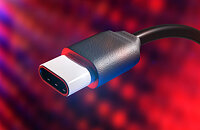- Joined
- Oct 9, 2007
- Messages
- 47,670 (7.43/day)
- Location
- Dublin, Ireland
| System Name | RBMK-1000 |
|---|---|
| Processor | AMD Ryzen 7 5700G |
| Motherboard | Gigabyte B550 AORUS Elite V2 |
| Cooling | DeepCool Gammax L240 V2 |
| Memory | 2x 16GB DDR4-3200 |
| Video Card(s) | Galax RTX 4070 Ti EX |
| Storage | Samsung 990 1TB |
| Display(s) | BenQ 1440p 60 Hz 27-inch |
| Case | Corsair Carbide 100R |
| Audio Device(s) | ASUS SupremeFX S1220A |
| Power Supply | Cooler Master MWE Gold 650W |
| Mouse | ASUS ROG Strix Impact |
| Keyboard | Gamdias Hermes E2 |
| Software | Windows 11 Pro |
Device IDs of Intel's upcoming line of standalone USB 4.0 host controllers leaked to the web, courtesy Hardware Leaks (@_rogame). The controller possibly comes in three variants, bearing device IDs 0x9A1B, 0x9A1D, and 0x9A13. The alleged Intel confidential document screengrab speaks of USB 4.0 and USB 3.2 support (no mention of USB 2.0/1.1), and USB Power Delivery 3.0.
With USB 4.0, the USB-IF (USB Implementers Forum, or the special interest group behind USB), appears to want to standardize the USB type-C connector, eventually phasing out the type-A connector. To that effect, the document leaves out mention of USB 2.0/1.1 backwards compatibility. USB 4.0 debuts with an interface bandwidth of 40 Gbps, or 8 times that of USB 3.0, or over 80 times that of USB 2.0.

View at TechPowerUp Main Site
With USB 4.0, the USB-IF (USB Implementers Forum, or the special interest group behind USB), appears to want to standardize the USB type-C connector, eventually phasing out the type-A connector. To that effect, the document leaves out mention of USB 2.0/1.1 backwards compatibility. USB 4.0 debuts with an interface bandwidth of 40 Gbps, or 8 times that of USB 3.0, or over 80 times that of USB 2.0.

View at TechPowerUp Main Site




